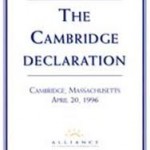 Someone (whom I will not name) wrote to me today the following:
Someone (whom I will not name) wrote to me today the following:
I’m a Cessationist all the way, John. I think it’s a very slippery slope once a person starts down that Charismatic path. And I see tremendous arrogance in the Reformed Charismatic camp. I believe this comes from the piety that results from thinking that one is a “super Christian” with a special blessing, and deeper connection to God, that others don’t have. Piety, piety, piety… It’s just another mystical encounter, and serves only to (1) get people hooked into getting their little mystical “hit” (instead of perhaps studying Scripture?) and (2) it promotes the aforementioned self-focused and sinful pietism.
There’s a good deal I could write in the way of a response, but here was my brief reply:
If you were to allow for a response I would point to the fact that reformed cessationist people have an equally repulsive reputation in the church world when it comes to pride – pride lurks in all of us. Yet it is poor argumentation to just say that because there are elements of pride in a camp, their arguments are invalid. That is a logical fallacy. A math teacher can be very prideful, even when he correctly tells people 2 + 2 = 4. So where does this leave us? where should we go? To the law and to the testimony (Isaiah 8:20) – to the God breathed Scriptures.
Then I would point out that you are ASSUMING a non-cessationist approach to 1 Cor 12-14 and yet, IF you were to put yourself in time of the first century when Paul wrote 1 Corinthians (when you believe the gifts were still functioning) and allow for continued use, ALL the arguments you make against contemporary reformed charismatics could be said of the Corinthian Church people too. In fact the Apostle Paul wrote about the issues better than you or I ever could, and under the inspiration of the Holy Spirit. The Corinthians were arrogant, carnal, self focused and far from piety.
Paul’s very reason for writing to the Corinthians was to STOP the focus on self and to exhort them to “pursue love, and earnestly desire the spiritual gifts” (1 Cor 14:1). Your arguments against reformed charismatics in our time amount to the very same things Paul sought to eliminate at Corinth. We have the exact same issues to deal with in our day because the human heart has not changed in 2,000 years – such is our depravity, and such is the inspiration of the Holy Spirit in addressing it.
However, lets remember, even though he was fully aware of the abuse of the gifts, Paul did not stop their use. Instead, he stopped the abuse and then directed their use. As he wrote elsewhere, “Do not quench the Spirit. Do not despise prophecies, but test everything; hold fast what is good.” (1 Thess 5:19-21) I for one am not prepared to class Paul’s apostolic instruction as putting the saints on some sort of “slippery slope.”

 Nothing short of Miraculous: Thank you to all who have been praying for my friend Jim. He was dead for a full 18 minutes last month after a heart attack (before being revived) and is due to leave the recovery care facility to come home in the next few days. We give thanks to God for prolonging Jim’s life (not many people have come back from such a condition) and yet we do covet your prayers for the remaining health issues to be resolved.
Nothing short of Miraculous: Thank you to all who have been praying for my friend Jim. He was dead for a full 18 minutes last month after a heart attack (before being revived) and is due to leave the recovery care facility to come home in the next few days. We give thanks to God for prolonging Jim’s life (not many people have come back from such a condition) and yet we do covet your prayers for the remaining health issues to be resolved.
 Its taken three weeks for my good friend, Indian Pastor Pappy Daniel to find the best possible deal, but as promised, here’s an update on the Gospel tract printing costs.
Its taken three weeks for my good friend, Indian Pastor Pappy Daniel to find the best possible deal, but as promised, here’s an update on the Gospel tract printing costs. Whereas the cost for 10,000 tracts was approximately $400 USA Dollars, the cost for 100,000 tracts will be $2,600.00. This is the full cost, which includes paper, printing, shipping and distribution handling costs. As you can see, there is a substantial savings (per tract) when there is a larger quantity being printed.
Whereas the cost for 10,000 tracts was approximately $400 USA Dollars, the cost for 100,000 tracts will be $2,600.00. This is the full cost, which includes paper, printing, shipping and distribution handling costs. As you can see, there is a substantial savings (per tract) when there is a larger quantity being printed. THE CAMBRIDGE DECLARATION of the Alliance of Confessing Evangelicals – April 20, 1996
THE CAMBRIDGE DECLARATION of the Alliance of Confessing Evangelicals – April 20, 1996